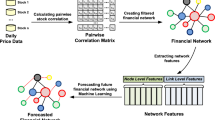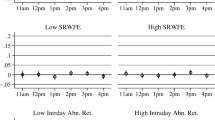Abstract
In the global context, we document evidence consistent with the informativeness of individual trades. Specifically, individuals are able to convey private information through their trading and improve intraday informational efficiency. Such an inference remains robust after mitigating the endogeneity concern. Additional examinations suggest that individual investors are conducive to promote efficient pricing of informed extreme price movements, online search information, and large-trade information. Taken together, these findings lend some credibility to the view that individuals are informed.
Similar content being viewed by others
Notes
The term “individual” and “retail” are often interchangeable in this study.
It refers to the benchmark index top on the equity market screen in the Bloomberg terminal.
References
Ayers B, Li O, Yeung P (2011) Investor trading and the post-earnings-announcement drift. Acc Rev 86:385–416
Barber B, Odean T (2000) Trading is hazardous to your wealth: the common stock investment performance of individual investors. J Financ 55:773–806
Barber B, Odean T (2008) All that glitters: The effect of attention on the buying behavior of individual and institutional investors. Rev Financ Stud 21:785–818
Barclay M, Hendershott T (2003) Price discovery and trading after hours. Rev Financ Stud 16:1041–1073
Barrot J, Kaniel R, Sraer D (2016) Are retail traders compensated for providing liquidity. J Financ Econ 120:146–168
Battalio R, Mendernhall R (2005) Earnings expectations, investor trade size, and anomalous returns around earnings announcements. J Financ Econ 77:289–319
Beveridge S, Nelson C (1981) A new approach to decomposition of economic time series into permanent and transitory components with particular attention to measurement of the business cycle. J Monet Econ 7:151–174
Boehmer E, Jones C, Zhang X, Zhang X (2021) Tracking retail investor activity. J Financ (Forthcoming)
Boehmer E, Wu J (2013) Short selling and the price discovery process. Rev Financ Stud 26:287–322
Brogaard J, Carrion A, Moyaert T, Riordan R, Shkilko A, Sokolov K (2018) High frequency trading and extreme price movements. J Financ Econ 128:253–265
Chen T (2019) The price impact of trade-size clustering: Evidence from an intraday analysis. J Bus Res 101:300–314
Chen T (2020) Trade-size clustering and informed trading in global markets. Int J Financ Econ 25:579–597
Comerton-Forde C, Putnins T (2015) Dark trading and price discovery. J Financ Econ 118:70–92
Da Z, Engelberg J, Gao P (2011) In search of attention. J Financ 66:1461–1499
Dellavigna S, Pollet J (2009) Investor inattention and Friday earnings announcements. J Financ 64:709–749
Drake M, Roulstone D, Thornock J (2012) Investor information demand: evidence from Google searches around earnings announcements. J Acc Res 50:1001–1040
Easley D, O’Hara M (1987) Prices, trade size and information in security markets. J Financ Econ 19:69–90
Ellul A (2006) Ripples through markets: inter-market impacts generated by large trades. J Financ Econ 82:173–196
Grinblatt M, Keloharju M, Linnainmaa J (2012) IQ, trading behavior, and performance. J Financ Econ 104:339–362
Hasbrouck J (1991) Measuring the information content of stock trades. J Financ 46:179–207
Hasbrouck J (2009) Trading costs and returns for U.S. equity: estimating effective costs from daily data. J Financ 64:1445–1477
Ho T, Stoll H (1981) Optimal dealer pricing under transactions and return uncertainty. J Financ Econ 9:47–73
Hou K, Moskowitz T (2005) Market frictions, price delay, and the cross-section of expected returns. Rev Financ Stud 18:981–1020
Hvidkjaer S (2008) Small trades and the cross-section of stock returns. Rev Financ Stud 21:1123–1151
Kaniel R, Saar G, Titman S (2008) Individual investor trading and stock returns. J Financ 63:273–310
Kelley E, Tetlock P (2013) How wise are crowds? Insight from retail orders and stock returns. J Financ 68:1229–1265
Keppo J, Shumway T, Weagley D (2017) Can individual investors time bubbles? Working Paper, Social Science Research Network
Koski J, Michaely R (2000) Prices, liquidity, and the information content of trades. Rev Financ Stud 13:659–696
Lee C, Radhakrishna B (2000) Inferring investor behavior: evidence from TORQ data. J Financ Mark 3:83–111
Linnainmaa J (2010) Do limit orders alter inferences about investor performance and behavior? J Financ 65:1473–1506
Petersen M (2009) Estimating standard errors in finance panel data sets: comparing approaches. Rev Financ Stud 22:435–480
Seru A, Shumway T, Stoffman N (2010) Learning by trading. Rev Financ Stud 23:705–739
Funding
Funding was provided by University of Macau (Grant No. MYRG2020-00042-FBA).
Author information
Authors and Affiliations
Corresponding author
Additional information
Publisher's Note
Springer Nature remains neutral with regard to jurisdictional claims in published maps and institutional affiliations.
Rights and permissions
About this article
Cite this article
Chen, T. Are individuals informed in global markets?. Empir Econ 63, 243–263 (2022). https://doi.org/10.1007/s00181-021-02141-0
Received:
Accepted:
Published:
Issue Date:
DOI: https://doi.org/10.1007/s00181-021-02141-0




